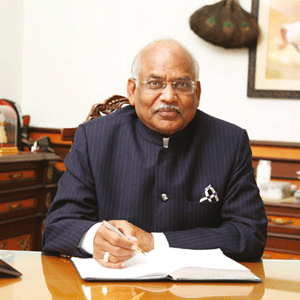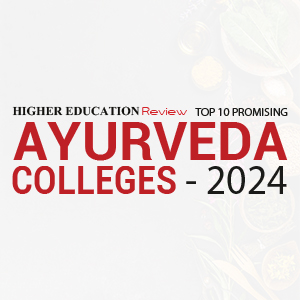
Coer Medical College Of Ayurveda & Hospital: Pioneering Excellence In Ayurvedic Education & Innovation
By Er. J C Jain, Chairman
Ayurvedic colleges in India play a vital role in preserving and promoting the ancient science of Ayurveda, which focuses on holistic healing and natural remedies. These institutions strive to integrate traditional Ayurvedic practices with modern medical advancements, ensuring comprehensive healthcare education. Recognizing the growing need for integrative and holistic healthcare approaches, Er. J C Jain, Chairman, embarked on a mission to establish a premier institution dedicated to the study and practice of Ayurveda. COER Medical College of Ayurveda and Hospital (CMCAH) was conceived as an extension of the esteemed legacy of COER University, which has been a top-ranked institution in engineering education for over two decades.
In 2020, CMCAH was officially established, marking a significant milestone in COER University's commitment to diversify its educational offerings and contribute to the healthcare sector. The aim was to create a center of excellence for Ayurveda education, research, and clinical practice that would serve not only the region of Uttarakhand but also the entire country.
With the establishment of CMCAH, the institute integrated modern medical facilities with traditional Ayurvedic practices. This fusion of ancient wisdom and contemporary technology reflects the institute's dedication towards providing comprehensive healthcare education. The BAMS course offered by CMCAH is affiliated with Uttarakhand Ayurveda University, Dehradun, and is approved by the National Commission for Indian System of Medicine (NCISM) and the Ministry of Ayush, New Delhi.
CMCAH offers distinctively designed courses to provide comprehensive, practical, and industry-relevant education, equipping students for successful professional careers in Ayurveda. The curriculum integrates traditional Ayurvedic principles with modern medical knowledge, ensuring a well-rounded education that bridges ancient wisdom and contemporary practices. It covers all critical aspects of Ayurveda, including basic sciences, clinical practice, pharmacology, pathology, and specialized treatments like Panchakarma and Marama Chikitsa.
A multidisciplinary approach fosters collaboration among students and healthcare professionals from various disciplines, enhancing their ability to work effectively in diverse healthcare settings. The emphasis on holistic education ensures students develop both technical and soft skills, including communication, empathy, and ethical practices. Professional development opportunities such as internships and real-world experience allow students to apply their knowledge in professional settings. Networking and career support programs, including workshops, seminars, and events, help students build valuable connections and navigate their career paths effectively. Community service engagement instills a sense of social responsibility and empathy, preparing students to serve diverse patient populations with compassion. The focus on patient-centered care trains students to develop individualized treatment plans and provide compassionate care, ensuring they meet the varied needs of their patients.
To maintain a high standard of education, CMCAH ensures the consistent quality of its faculty members through a rigorous recruitment process, continuous professional development, performance evaluation, research support, mentorship, state-of-the-art infrastructure, recognition, and support for work-life balance. The selective hiring process evaluates candidates based on academic credentials, professional experience, research contributions, and teaching skills. Regular training programs, encouragement for further studies, and research incentives keep faculty members updated with the latest advancements in Ayurveda and medical education.
Self-motivation, annual appraisals, student feedback, and peer reviews ensure high teaching standards are maintained. Faculty members are provided with resources and support for research projects and publications, and collaborations with other institutions enable innovative projects. Mentorship programs and a collaborative environment enhance teaching methodologies and professional growth. Modern facilities and technological integration assist faculty in delivering effective and engaging lectures. Faculty recognition and career advancement opportunities motivate faculty members to continue their high-quality work, while a healthy work environment and counselling services ensure a positive work-life balance.
CMCAH is dedicated to preparing students for the healthcare industry through a strategic blend of comprehensive education, practical experience, and professional development initiatives. Students gain extensive hands-on experience through CMCAH’s 100-bed hospital, which includes ICU, NICU, emergency care, and specialized units like Panchakarma and Marama Chikitsa. Regular medical camps, hospital visits, and guest lectures by industry experts provide students with real-world clinical exposure, bridging the gap between theoretical knowledge and practical application.
The faculty, comprising experienced professionals, offers personalized mentorship and guidance, while the curriculum covers all aspects of Ayurveda, emphasizing research and innovation to foster continuous learning and development. CMCAH also prioritizes professional development through internships and real-world training opportunities, enabling students to apply their knowledge in professional settings. Networking opportunities through workshops, seminars, and events help students connect with industry leaders and build valuable relationships.
The multidisciplinary approach encourages collaboration among healthcare professionals, enhancing students' ability to work effectively in diverse environments. The emphasis on holistic development ensures that students acquire both technical and soft skills such as communication, empathy, and ethical practices.
CMCAH’s state-of-the-art infrastructure, including advanced laboratories and digital learning resources, supports these educational initiatives, while community engagement programs and patient-centered care training instil a sense of social responsibility and empathy in students. Small class sizes, career counselling, and placement support further ensure that CMCAH graduates are well-prepared for successful careers in Ayurveda and healthcare.
Aiming to elevate its educational standards through a multifaceted approach, CMCAH is embracing emerging technologies such as AI, VR, AR, and simulation-based learning. The institute seeks to create immersive educational experiences that enhance theoretical understanding and practical application. Personalized learning paths will be implemented to cater to individual student needs, ensuring tailored support and appropriate challenges.
Interdisciplinary programs will be developed to integrate diverse knowledge and skills, fostering creativity and innovation. Expanding experiential learning opportunities through internships, fieldwork, clinical rotations, and community projects will provide students with practical skills and deepen their understanding. To enhance global exposure, CMCAH plans to offer international exchange programs, collaborative research initiatives, and coursework with global perspectives.
The institution will emphasize soft skills and leadership training, integrating essential skills like communication, teamwork, critical thinking, and emotional intelligence into the curriculum. Establishing research and innovation hubs will encourage collaboration on cutting-edge projects. Continuous professional development for faculty will ensure they remain updated with the latest pedagogical methods and industry trends.
Strengthening industry partnerships and advisory boards will keep the curriculum relevant to industry needs and facilitate practical opportunities. Additionally, a focus on ethical practices, social responsibility, and sustainability will be integrated into courses and activities.
In 2020, CMCAH was officially established, marking a significant milestone in COER University's commitment to diversify its educational offerings and contribute to the healthcare sector. The aim was to create a center of excellence for Ayurveda education, research, and clinical practice that would serve not only the region of Uttarakhand but also the entire country.
With the establishment of CMCAH, the institute integrated modern medical facilities with traditional Ayurvedic practices. This fusion of ancient wisdom and contemporary technology reflects the institute's dedication towards providing comprehensive healthcare education. The BAMS course offered by CMCAH is affiliated with Uttarakhand Ayurveda University, Dehradun, and is approved by the National Commission for Indian System of Medicine (NCISM) and the Ministry of Ayush, New Delhi.
Enhancing Ayurvedic Education & Faculty Excellence
CMCAH offers distinctively designed courses to provide comprehensive, practical, and industry-relevant education, equipping students for successful professional careers in Ayurveda. The curriculum integrates traditional Ayurvedic principles with modern medical knowledge, ensuring a well-rounded education that bridges ancient wisdom and contemporary practices. It covers all critical aspects of Ayurveda, including basic sciences, clinical practice, pharmacology, pathology, and specialized treatments like Panchakarma and Marama Chikitsa.
A multidisciplinary approach fosters collaboration among students and healthcare professionals from various disciplines, enhancing their ability to work effectively in diverse healthcare settings. The emphasis on holistic education ensures students develop both technical and soft skills, including communication, empathy, and ethical practices. Professional development opportunities such as internships and real-world experience allow students to apply their knowledge in professional settings. Networking and career support programs, including workshops, seminars, and events, help students build valuable connections and navigate their career paths effectively. Community service engagement instills a sense of social responsibility and empathy, preparing students to serve diverse patient populations with compassion. The focus on patient-centered care trains students to develop individualized treatment plans and provide compassionate care, ensuring they meet the varied needs of their patients.
To maintain a high standard of education, CMCAH ensures the consistent quality of its faculty members through a rigorous recruitment process, continuous professional development, performance evaluation, research support, mentorship, state-of-the-art infrastructure, recognition, and support for work-life balance. The selective hiring process evaluates candidates based on academic credentials, professional experience, research contributions, and teaching skills. Regular training programs, encouragement for further studies, and research incentives keep faculty members updated with the latest advancements in Ayurveda and medical education.
Self-motivation, annual appraisals, student feedback, and peer reviews ensure high teaching standards are maintained. Faculty members are provided with resources and support for research projects and publications, and collaborations with other institutions enable innovative projects. Mentorship programs and a collaborative environment enhance teaching methodologies and professional growth. Modern facilities and technological integration assist faculty in delivering effective and engaging lectures. Faculty recognition and career advancement opportunities motivate faculty members to continue their high-quality work, while a healthy work environment and counselling services ensure a positive work-life balance.
Holistic Approach to Industry-Ready Ayurvedic Education
CMCAH is dedicated to preparing students for the healthcare industry through a strategic blend of comprehensive education, practical experience, and professional development initiatives. Students gain extensive hands-on experience through CMCAH’s 100-bed hospital, which includes ICU, NICU, emergency care, and specialized units like Panchakarma and Marama Chikitsa. Regular medical camps, hospital visits, and guest lectures by industry experts provide students with real-world clinical exposure, bridging the gap between theoretical knowledge and practical application.
The faculty, comprising experienced professionals, offers personalized mentorship and guidance, while the curriculum covers all aspects of Ayurveda, emphasizing research and innovation to foster continuous learning and development. CMCAH also prioritizes professional development through internships and real-world training opportunities, enabling students to apply their knowledge in professional settings. Networking opportunities through workshops, seminars, and events help students connect with industry leaders and build valuable relationships.
The multidisciplinary approach encourages collaboration among healthcare professionals, enhancing students' ability to work effectively in diverse environments. The emphasis on holistic development ensures that students acquire both technical and soft skills such as communication, empathy, and ethical practices.
CMCAH’s state-of-the-art infrastructure, including advanced laboratories and digital learning resources, supports these educational initiatives, while community engagement programs and patient-centered care training instil a sense of social responsibility and empathy in students. Small class sizes, career counselling, and placement support further ensure that CMCAH graduates are well-prepared for successful careers in Ayurveda and healthcare.
Roadmap for Enhancing Education Quality
Aiming to elevate its educational standards through a multifaceted approach, CMCAH is embracing emerging technologies such as AI, VR, AR, and simulation-based learning. The institute seeks to create immersive educational experiences that enhance theoretical understanding and practical application. Personalized learning paths will be implemented to cater to individual student needs, ensuring tailored support and appropriate challenges.
Interdisciplinary programs will be developed to integrate diverse knowledge and skills, fostering creativity and innovation. Expanding experiential learning opportunities through internships, fieldwork, clinical rotations, and community projects will provide students with practical skills and deepen their understanding. To enhance global exposure, CMCAH plans to offer international exchange programs, collaborative research initiatives, and coursework with global perspectives.
The institution will emphasize soft skills and leadership training, integrating essential skills like communication, teamwork, critical thinking, and emotional intelligence into the curriculum. Establishing research and innovation hubs will encourage collaboration on cutting-edge projects. Continuous professional development for faculty will ensure they remain updated with the latest pedagogical methods and industry trends.
Strengthening industry partnerships and advisory boards will keep the curriculum relevant to industry needs and facilitate practical opportunities. Additionally, a focus on ethical practices, social responsibility, and sustainability will be integrated into courses and activities.


